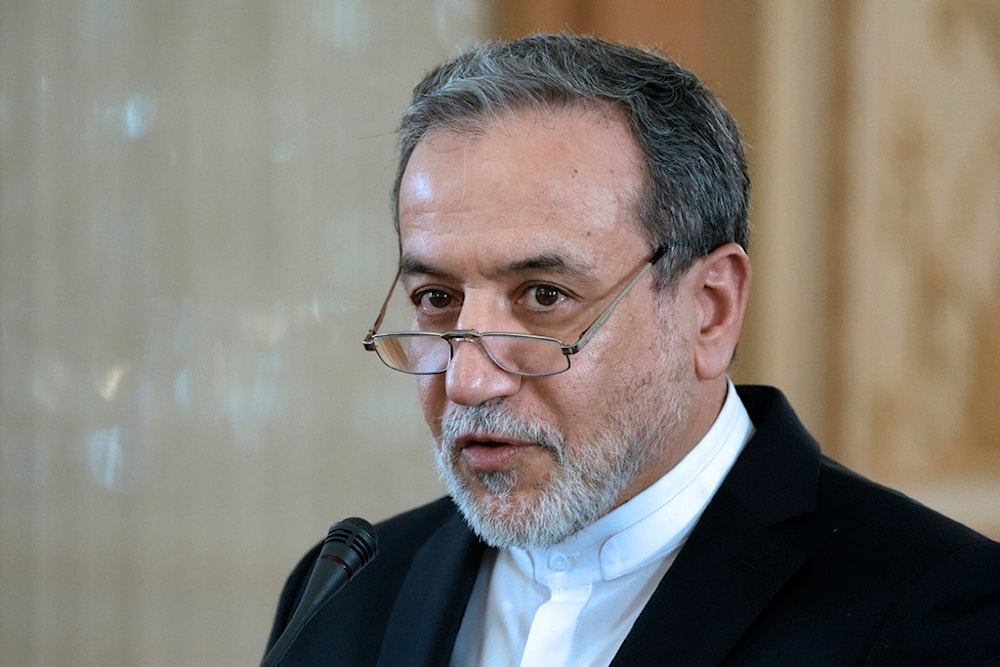Iran open to talks but rejects US 'maximum pressure' policy: Iran FM
Iran's Supreme Leader Ayatollah Ali Khamenei has dismissed the idea of negotiations under Washington's current strategy, characterizing such talks as dishonorable and unwise.
-

Iranian Foreign Minister Abbas Araghchi speaks in a joint press briefing with his Syrian counterpart Bassam Sabbagh, in Tehran, Iran, Tuesday, Nov. 19, 2024. (AP Photo/Vahid Salemi)
Tehran has expressed its readiness for diplomatic talks with Washington but has firmly rejected engaging under the "maximum pressure" policy pursued by US President Donald Trump, according to Iranian Foreign Minister Abbas Araghchi.
In a statement published on Telegram, Araghchi reiterated Iran's stance, stating, "The lifting of sanctions requires negotiations, but not within the framework of a 'maximum pressure' policy, because it would not be a negotiation but a form of surrender."
The maximum pressure campaign, which was reimposed by Trump in February 2025, includes harsh economic sanctions targeting Iran's oil exports, banking sector, and key industries.
The goal of the policy has been to cripple Tehran's economy and force Iran's change of policy on issues such as its nuclear program, regional influence, and missile development.
Despite the severe economic toll, including a devaluation of the Iranian rial, Tehran has remained defiant, insisting that negotiations cannot take place under economic duress.
The Iranian currency recently hit record lows against the US dollar, reflecting the impact of renewed sanctions. However, Iranian officials maintain that capitulating under pressure is not an option.
This firm stance has been echoed by Iran's Supreme Leader Ayatollah Ali Khamenei, who has dismissed the idea of negotiations under Washington's current strategy, characterizing such talks as dishonorable and unwise.
Iranian leadership views the "maximum pressure" approach not as a legitimate diplomatic tool but as economic warfare, making any potential dialogue contingent on Washington shifting its stance.
Iran unfazed by Trump's oil export threats
Iranian President Masoud Pezeshkian on Wednesday dismissed Donald Trump's threats on Iranian oil exports, noting that Iran possesses various other means of generating revenues.
"They think that everything we do depends on oil so they can stop it, while there are many other ways," the Iranian president stated, rejecting the notion that US sanctions could cripple Iran's economy. He noted that the country has generated significant revenue through energy exports to a diverse range of international buyers.
Pezeshkian further asserted Iran's economic resilience, declaring, "We are a powerful country, and our reserves and resources are exceptional in the world." He argued that despite ongoing US sanctions, Tehran is capable of sustaining its economy through strategic resource management. "The United States is sanctioning us, but if we manage our own resources, we will solve our problems," he added.
Read more: Trump's first Iran sanctions target 3 ships in crude trade with China
Earlier that day, Iranian officials also responded to Trump's revival of the "maximum pressure" campaign, particularly his claim that Iran seeks nuclear weapons.
Mohammad Eslami, head of Iran's Atomic Energy Organization (AEOI), rejected the accusation outright, stating, "Trump has said that Iran should not have nuclear weapons; Iran had no intention of obtaining nuclear weapons, does not have and will not have."

 3 Min Read
3 Min Read










